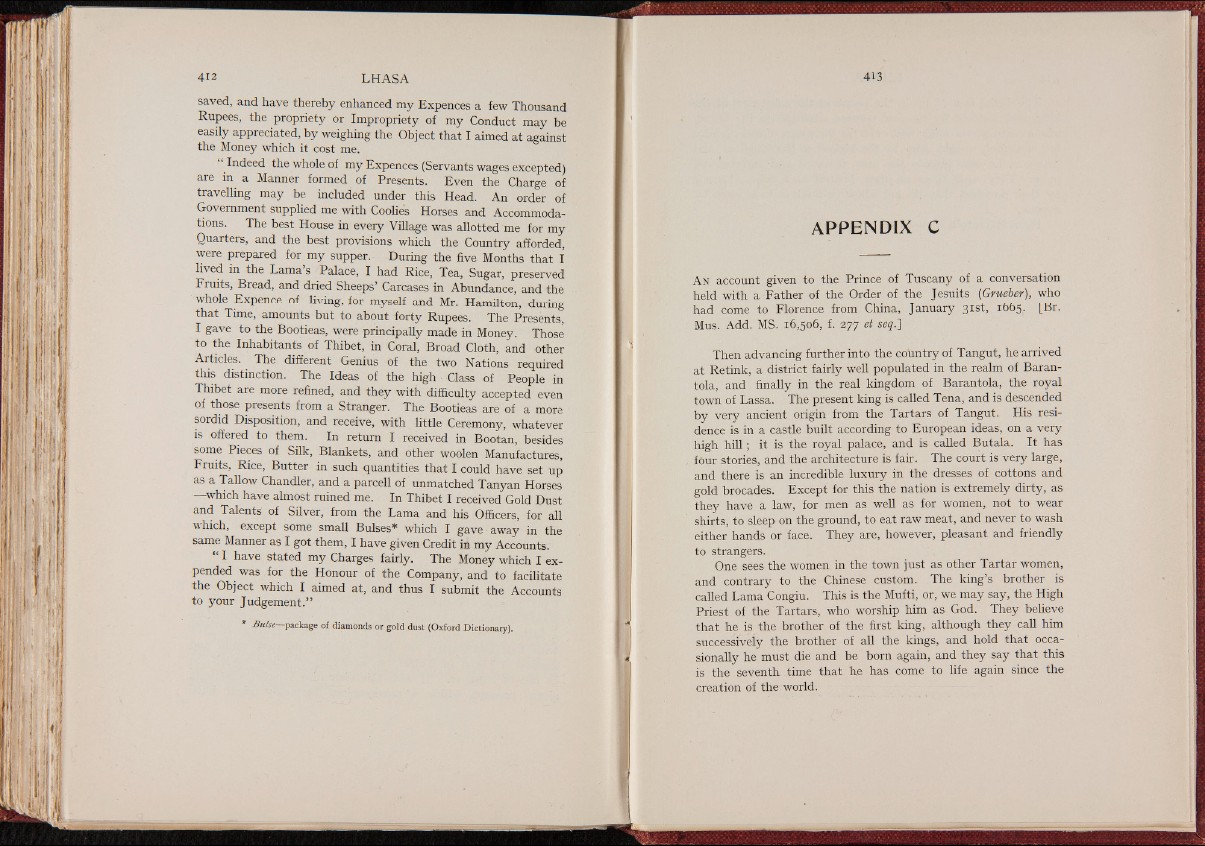
saved, and haye thereby enhanced my Expences a few Thousand
Rupees, the propriety or Impropriety of my Conduct may be
easily appreciated, by weighing the Object that I aimed at against
the Money which it cost me.
Indeed the whole of my Expences (Servants wages excepted)
are in a Manner formed of Presents. Even the Charge of
travelling may be included under this Head. An order of
Government supplied me with Coolies Horses and Accommodations.
The best House in every Village was allotted me for my
Quarters, and the best provisions which the Country afforded,
were prepared for my supper. During the five Months that I
lived in the Lama’s Palace, I had Rice, Tea, Sugar, preserved
Fruits, Bread, and dried Sheeps’ Carcases in Abundance, and the
whole Expence of living, for myself and Mr. Hamilton, ^during
that Time, amounts but to about forty Rupees. The Presents,
I gave to the Bootieas, were principally made in Money. Those
to the Inhabitants of Thibet, in Coral, Broad Cloth, and other
Articles. The different Genius of the two Nations required
this distinction. The Ideas of the high ■ Class of People in
Thibet are more refined, and they with difficulty accepted even
of those presents from a Stranger. The Bootieas are of a more
sordid Disposition, and receive, with little Ceremony, whatever
is offered to them. In return I received in Bootan, besides
some Pieces of Silk, Blankets, and other woolen Manufactures,
Fruits, Rice, Butter in such quantities that I could have set up
as a Tallow Chandler, and a parcell of unmatched Tanyan Horses
— which have almost ruined me. In Thibet I received Gold Dust
and Talents of Silver, from the Lama and his Officers, for all
w hich, except some small Bulses* which I gave away in the
same Manner as I got them, I have given Credit in my Accounts.
I have stated my Charges fairly. The Money which I expended
was for the Honour of the Company, and to facilitate
the Object which I aimed at, and thus I submit the Accounts
to your Judgement.”
* B u lse package of diamonds or gold dust (Oxford Dictionary).
APPENDIX C
A n account given to the Prince of Tuscany of a conversation
held with a Father of the Order of the Jesuits (Grueber), who
had come to Florence from China, January 31st, 1665. [Br.
Mus. Add. MS. 16,506, f. 277 et seq.']
Then advancing further into the country of Tangut, he arrived
at Retink, a district fairly well populated in the realm of Baran-
tola, and finally in the real kingdom of Barantola, the royal
town of Lassa. The present king is called Tena, and is descended
by very ancient origin from the Tartars of Tangut. His residence
is in a castle built according to European ideas, on a very
high hi l l ; it is the royal palace, and is called Butala. It has
four stories, and the architecture is fair. The court is very large,
and there is an incredible luxury in the dresses of cottons and
gold brocades. Except for this the nation is extremely dirty, as
they have a law, for men as well as for women, not to wear
shirts, to sleep on the ground, to eat raw meat, and never to wash
either hands or face. They are, however, pleasant and friendly
to strangers.
One sees the women in the town just as other Tartar women,
and contrary to the Chinese custom. The king’s brother is
called Lama Congiu. This is the Mufti, or, we may say, the High
Priest of the Tartars, who worship him as God. They believe
that he is the brother of the first king, although they call him
successively the brother of all the kings, and hold that occasionally
he must die and be born again, and they say that this
is the seventh time that he has come to life again since the
creation of the world.